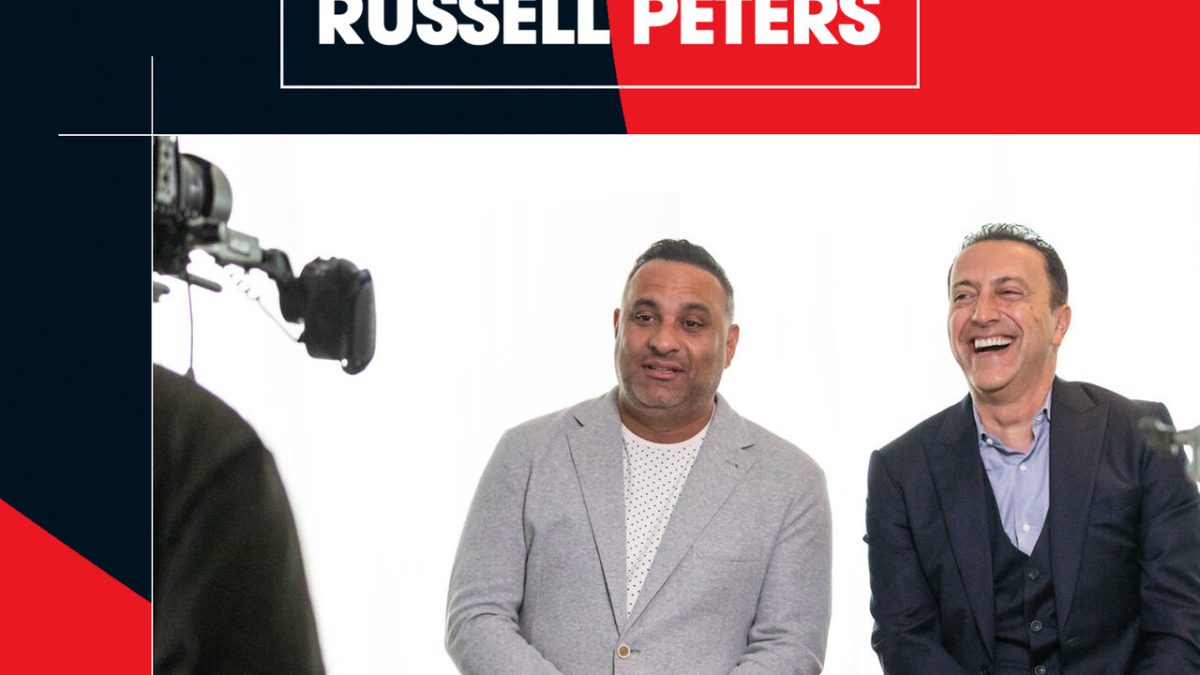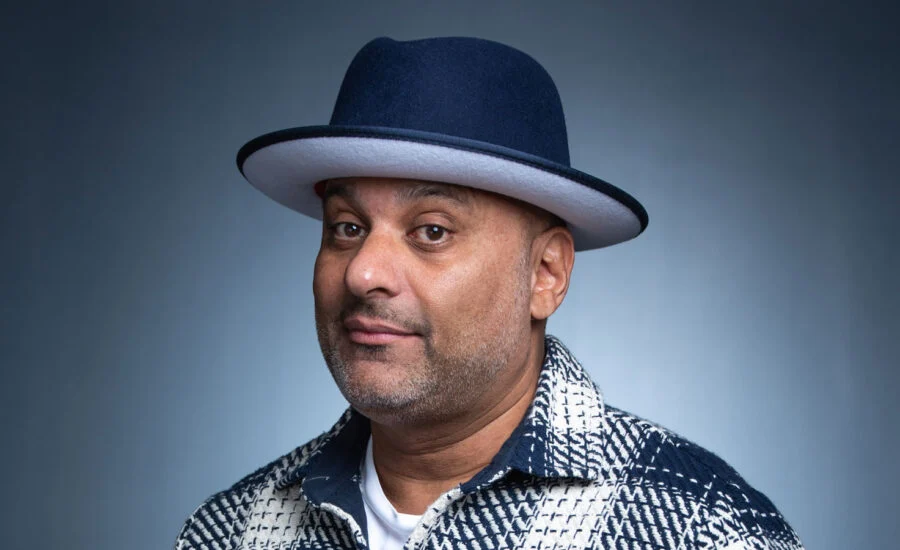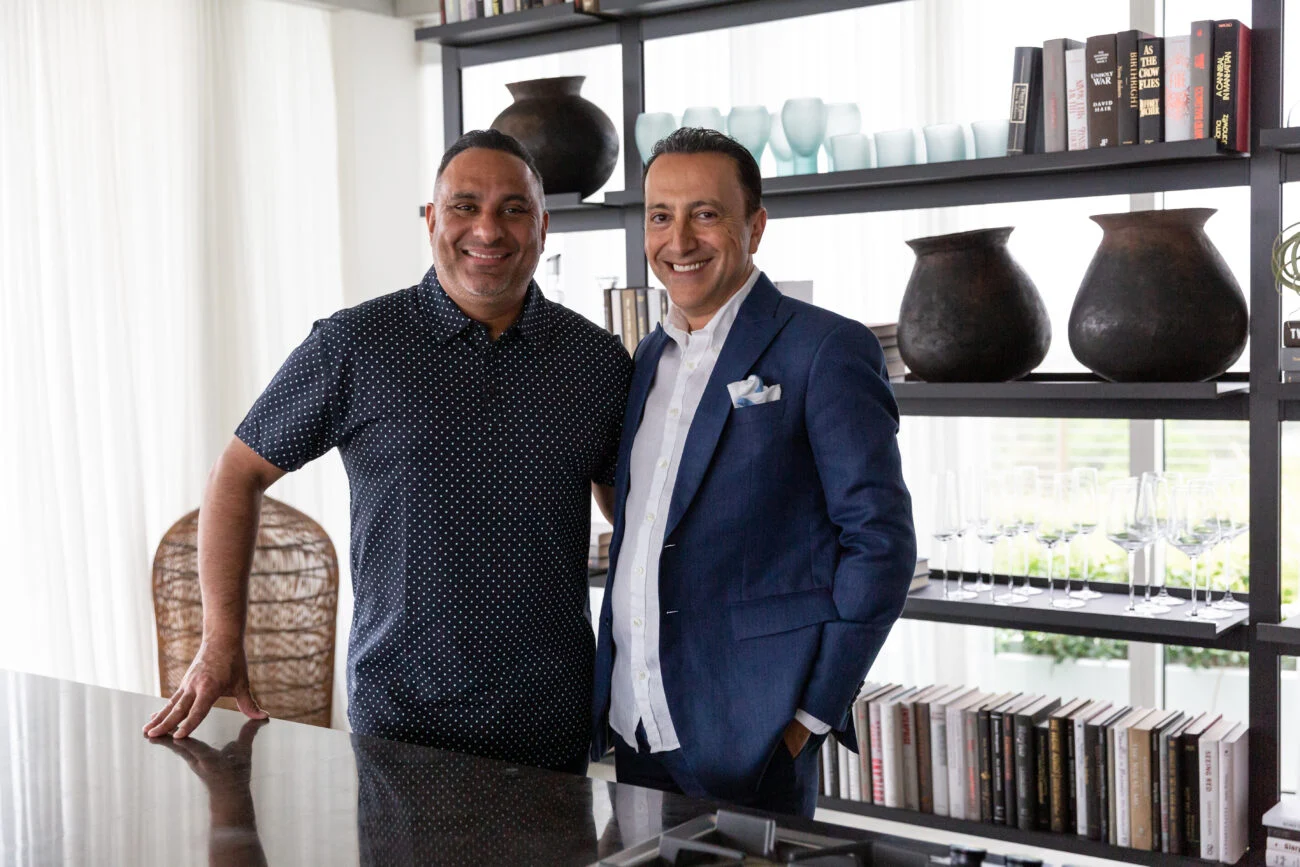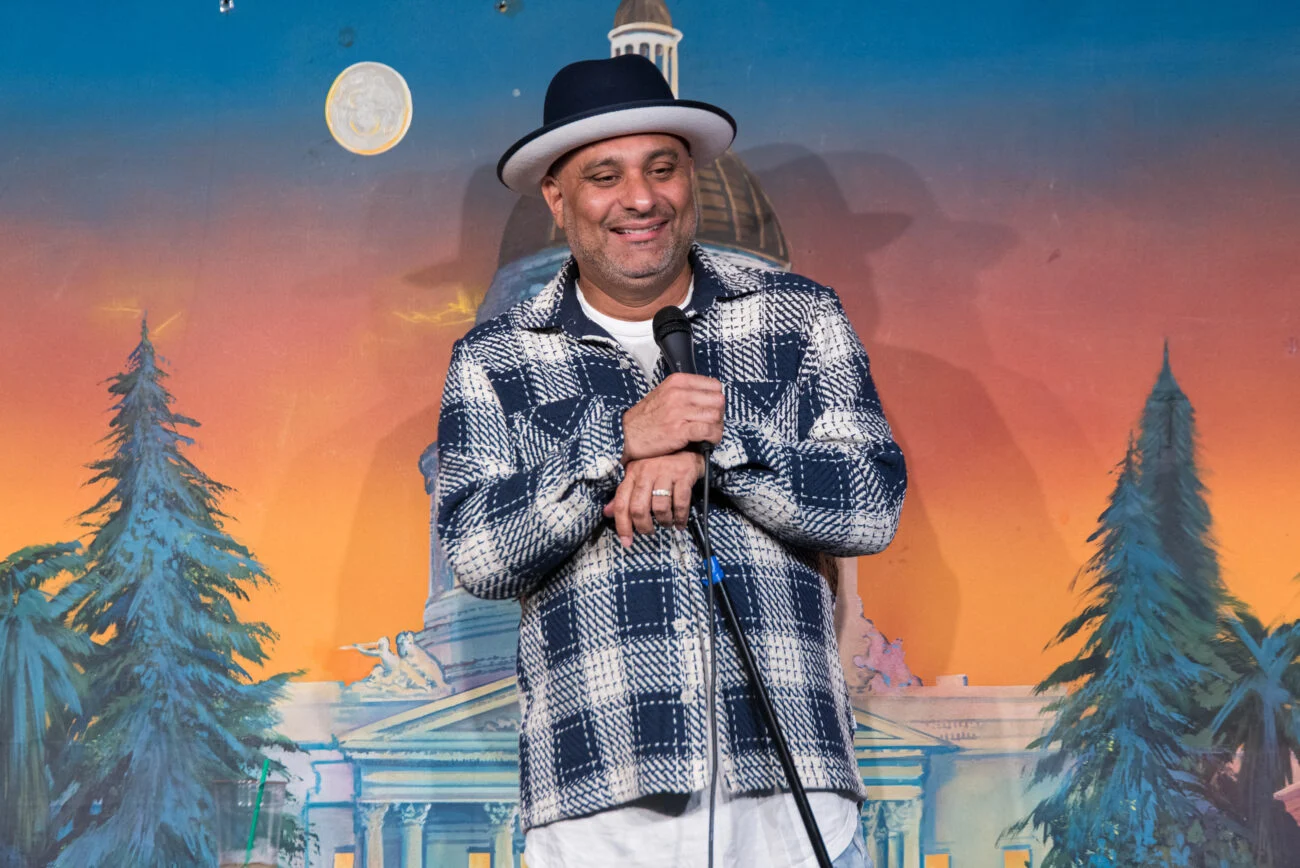
Close



Photo courtesy of The Condo Store
This article originally appeared on MoneySense.ca and has been published here with permission.
What’s Russell Peters doing now? Investing, and it’s a laugh
We all learned about our money during the lockdowns, and so did comedian Russell Peters. He sits down with MoneySense to chat about his new investments, giving away money and more.
Money is no joke—or is it? For Brampton, Ont., native and celebrated comedian Russell Peters, money is as funny as it is serious because, well, everything is funny through his perspective (iykyk). He’s very into real estate (the stand-up comic loves collecting houses) and has recently bought two condos in Toronto as part of his ambassador partnership with The Condo Store Realty Inc. While Peters does live in Los Angeles, he stopped in Toronto to meet with Simon S. Mass, founder and CEO of the real estate investment firm in Liberty Village, where he also sat down with MoneySense. We talked about his investments, had a few laughs, discussed money lessons he’s learned, had a few more laughs, chatted about downsizing—and laughed some more.
Lisa Hannam: You have five or six homes. What is it about real estate that makes you keep wanting to collect?
Russell Peters: Well, I have properties. But I didn’t buy them as investment or rental properties. I don’t know if it’s a mistake or not. But it might have been a couple of those good mistakes, like a Bob Ross kind of thing. Let’s just make this a beautiful mistake.
I was buying properties to live in. I was just an idiot, going like “that,” buy “that.” I’ve got all these properties, but I never really considered doing investment properties. I started talking to Simon, and he made it make sense to me.
LH: Tell me about your partnership and what you are working on together.
RP: Oh, Simon, tell me about that.
Simon S. Mass: Russell and I met about three years ago. At that time, I was doing a little wish-list item, which was to be an executive producer. So, there was a TV mini-series on TSN with Danny Green, when he was a Raptors player. And one of the episodes was a tour of Brampton, with Daniel Green and Russell Peters. I attended the shoot. We met and we got along.

Russell Peters and Simon S. Mass
The next night we went to Russell’s mom’s house for dinner. We became friends first. And, you know, COVID happened. We were in touch constantly talking about everything, including real estate. I was encouraging Russell to buy some real estate in Toronto. That’s not a place he wants to live in, but [it’s where] he wants to invest. It’s great to go and buy incredible homes, but they don’t really generate long-term income. So that’s how it got started. We then started thinking, what if Russell was a client of ours? It’d be great to have Russell come on board as a brand ambassador.We’re working on two different properties together right now.
RP: We’ll probably expand from there. You know, see how that goes. Even as a client, and a friend, I don’t stop being a skeptic. That’s just who I am as a person. And I think that helps me work with the brand, because it’s not like I’m the guy that’s just going to go and accept anything. I’m going to give it to you straight from the way I saw it. And so far, so good.
“Comedians by nature are idiots. I know this first-hand because I’m an idiot with money. I’m getting better at it now, but I did some ridiculously idiotic things.”
LH: Are you renting them? Is that the goal?
SSM: So, our specialty, the space we dominate, is pre-construction. So, we are in the business of buying pre-construction condos, about half a billion dollars’ worth of pre-construction condos in Toronto annually. And those condos take, on average, five to seven years to be completed. So, anything that Russell is in right now will not be completed for another four to six years. So, there’s plenty of time for them to be completed. But frankly, we’ve been doing this for 30 years; 17 years as The Condo Store. So, we’ve got $25 billion worth of investment transactions. We’ve exited quite a lot of them. The market is improving year after year.
LH: So, you have time to decide if you want to move in?
RP: We have time for a lot of things in that space. I have time for a couple more marriages.
LH: I read that you gave a homeless man $100, and then he opened a show for you.
RP: A few years ago, I was in Santa Monica. I came out of a restaurant, and this guy walks up to me, he’s clearly on drugs, clearly strung out. Filthy, homeless.
And he says, “Hey, I’m down on my luck.” And I go, “I see that.” And then he says, “Wait a minute, are you Russell Peters?” And I’m like, “Wait, how do you know who I am? How do you know who anybody is?”He starts talking to me about how his mom’s Guyanese and his dad’s German or something. And he says, “I’m embarrassed. I was the little chubby kid on Mighty Ducks.” I was like, “What?” And he says, “I was in Heavyweights.” I was like, “That was you?” He was all gaunt and completely just a shell of a man. But I could see in his eyes he wasn’t gone. You could see he wanted to get out of that world, but he didn’t know how. I gave him 100 bucks that day. That’s what I had in my pocket. I said, “If I give you this, are you going to buy drugs?” And he goes, “Not with all of it.” I’m like, “Well, at least you’re honest.”
That was maybe five, six years ago. I never thought about it again. Then, a few months ago, I got a message on my Instagram: “I don’t know if you’ll remember this, but I was the guy outside of the deli you gave 100 bucks [to]. And I really appreciate it. And I’ve been sober now for three years.” I looked at his [Instagram] page, and you could see he gained his weight back and he looked really good. He went on… “I’ve been doing stand-up now and I’m really focused.” I go, “Of course, I remember you.”He went, “I see you’re playing at Oxnard. I’d love to come see the show.” And I said, “Why don’t you come and do some time on my show?”
So, he did. He came and he did great. He’s a great kid, Shaun Weiss. He’s clean now. He’s sober. He’s an advocate. He’s got an addictive nature. So, I told him, “Why don’t you turn your addiction into stand-up? Focus on that. It’s only a win. You’re only going to win.”
LH: I love that story. Which comedian is surprisingly smart about money? Who gives the best investing advice?
RP: Comedians by nature are idiots. I know this first-hand, because I’m an idiot with money. I’m getting better at it now, but I did some ridiculously idiotic things. When you come from nothing, you automatically are just like, “Well, I’m supposed to have nothing. So, if I get this incentive, no big deal. I know what nothing is. I know nothing better than I know something.”So, we are not particularly good spenders. We’re pretty obnoxious. I think Sebastian Maniscalco might be good at it. We’re friends, but we don’t talk money.That’s the other thing: Comics don’t like to talk money.Dave Chappelle might be really good with money because he knows how much money he makes. He probably brings in somewhere close to $100 million a year. And he moved to Ohio. He didn’t go for the big, glitzy thing; he bought a farm. I’m sure he’d spent no more than a million dollars, a million and a half. He’s very happy out there.
“Sometimes when people are intro-ing me at a comedy club, they’ll say, ‘He’s one of the richest…’ and I’m like, ‘Don’t say that. Just say I’m the funniest’.”
LH: I know George Carlin is a huge icon for you. I found this quote from him: “Most people work hard enough to not get fired and get paid enough to not quit.” What’s your favourite money bit from Carlin?
RP: I don’t know that I could quote a bit of his. Here’s what it’s about: a place for your stuff. You get stuff. And then you need a place to put your stuff. And the more stuff you get, the bigger the place you need.
LH: That’s why you have so many houses.
RP: That’s why—I have a lot of stuff. It’s funny, my house in Los Angeles is 8,000 square feet, and I literally don’t have enough space. I had to call my builder to come and put some shelving in the kitchen and in the garage because I got no room for anything.
LH: You’re used to talking about taboo topics. When it comes to money, salaries and debt, they’re not often talked about. What do you think we need to do to make people talk about it more?
RP: I think we need to make people understand that—I can only relate it to the entertainment [industry], maybe the sports world as well—when you hear “Russell makes $30 million this year,” you go, “Wow, Russell Peters has $30 million!” But you need to know he f–king does not have $30 million. First of all, the taxman is taking 50% of that. So now you’re at $15 million, but you also have your manager and agents. That’s another 20% of the $30 million. You’re losing all this money on the way. So, if you see the number of $30 million you can be sure that—maybe, if I was lucky—I got $9 million. Maybe.LH: We can relate, but with lower numbers. You need to do what the average person does and get the tax taken off when you get your cheque.Why can we easily talk about investing?
RP: Because that’s a way to make money while you’re sleeping.That’s the smart, smart way to do it. And I’ve subsequently become friends with a lot of very successful people, especially in the real estate world. Most successful people you meet are successful through real estate. Donald Trump was successful through real estate. It doesn’t mean he’s a genius. It just means he was just kind of realistic.You’ve got obviously the Elon Musks of the world and the Steve Jobs, who were the creatives able to make things you need. But at the end of the day, most of the really successful people have been real estate people.And, my friends that are very successful because they’re billionaires, they were just okie dokes from St. Louis. They’re not like these guys that went to Harvard, right. These are just regular guys, and they’re sitting on billions of dollars now because they know how to invest. They know what to buy, where to buy, when to buy.And they’re helping me with that, as well as Simon. He is one of those guys. He’s just a dumb prick from Wales. He came to Canada. He didn’t speak any English. He spoke Welsh for no reason.
SSM: I came with $20, and that’s my story.
RP: But again, he’s another guy. All these guys look successful. Everybody who gets involved in real estate does. People go, “I’m never going to get there.” That’s because you haven’t started. You’ve got to start. It’s not going to happen right away. But it’s a snowball effect.
SSM: Real estate is something anyone and everyone can get into. And it’s Canada’s favourite pastime, right now. There’s not a single time I’ve been to a coffee shop or a restaurant, where I can’t hear the next table talking about selling their house or about to buy their house or they’re about to buy an investment property. Everybody loves the real estate game.

Russell Peters and Simon S. Mass
I think it has a lot to do with the fact you have some pride in ownership, you get to drive by something and point and say, “I have a unit there.” You don’t get that with stocks.And I think if anyone is thinking about what to do next in real estate, whether they’re somebody that’s new [to real estate] and a recent graduate, for example, which is one of the best types of demographics to get into real estate investing, because they’re in their early 20s—you’ve got time.
RP: And you don’t have kids and you have no dependents. You’re good, that’s probably the best time to do something.
SSM: They’ve got time on their hands, right. And real estate works.The best of all these guys Russell was speaking about are actual real estate billionaires. They’re all in their 60s or 70s.It doesn’t mean you have to be a billionaire. But the reality is, if you start at the age of 25, by the time you’re 50, even if you have three apartments and three condos, you’ve got yourself about $6 million worth of assets, which you wouldn’t have had by just going to your day job. There’s a lot of sacrifices. People who invest in real estate have to cut back on other things.
LH: I read a Forbes article about you that dropped a whole bunch of million-dollar signs for every packed show you’ve ever had, but then they called you “notoriously unknown.” How does wealth play into your identity?
RP: Somebody I know once said to Jerry Seinfeld, “Hey, Jerry, do you know Russell Peters?” And Jerry’s response was “Russell Peters is very successful.” Not “funny.”
Nobody says, “He’s funny.” That’s the worst part. That’s the part that bothers me. I don’t care about the success part. But you could’ve started that [sentence] with “funny” and then say “successful,” “very successful,” “makes a lot of money.” Sometimes when people are intro-ing me at a comedy club, they’ll say, “He’s one of the richest…” and I’m like, “Don’t say that. Just say I’m the funniest.” Let’s go with “funny.” Because it’s my job to be funny. It’s not my job to be a rich guy. Because I’m not a rich guy. I did well for myself, but that doesn’t make me a rich guy. I got lucky.
LH: Well, no you worked hard for that.
RP: I worked hard, but still, there’s a certain amount of luck.
LH: You’ve also talked about your parents not identifying with their jobs. It’s just what they did; it’s not who they are. Does any of that play on to you?
RP: I am who I am. I mean, you’re born this way. You’re born a comedian. If you’re a comic, you’re probably born with it and you’re good at it.

RP: There are people that learned to be good at it. But it doesn’t mean it’s their natural calling.
I know, no matter how long I’m in this—I’ve been in the business for 33 years—I’m going to be in it for at least another 30. I’ve done movies, but I don’t care if I do any more movies. I don’t care because my whole focus is stand-up. That’s all I want to do. And I invest because, I found out the hard way, I hadn’t made any wise investments. I quickly learned over COVID that you need to make money when you’re sleeping. And I wasn’t. I was just [passing] gas when I was sleeping.
LH: I was going to ask you about that as well. While not everyone can relate to being a comedian, they can relate to having unpredictable streams of income. So, what have you learned from that experience?
RP: Well, I learned I was spending as much as I was making. And I subsequently learned how to curb that. You learn quickly how to adapt. So, you just learn how to be wiser with your money.
LH: What was the “aha” moment?
RP: Oh, COVID was the “aha” moment where I didn’t realize [what money I was spending and not making]. And I’ll give out numbers; I’m not afraid of it. I didn’t realize my monthly nut was $250,000 a month. That’s what I was spending a month to keep everything afloat. That’s insane. Companies don’t do that, why would I do that?I was doing it to myself. That’s the worst part. It wasn’t like somebody did it to me. I did it to myself. And I was like, “Oh, hell no.” And I just started cutting everything off.
LH: So, you budgeted?
RP: I—what do they call it?—I restructured.
LH: When did you feel like you made it? Was there a financial status for you? Was it like something career-wise?
RP: Honestly, it’s going to sound cliché, but I don’t think I’ve “made it.” I still think there’s a lot more for me to do, to make me feel like I’ve made it. To other people, am I successful? Sure. And I am successful. But have I made it? No, not yet.
LH: What is that point?
RP: I don’t know what the moment is. I think if you can pinpoint that then you’re going to do yourself a disservice and not enjoy the ride.
LH: You didn’t write yourself a cheque, like Jim Carrey did?
RP: No. See, that’s white privilege—to know it could happen one day. For me, it was all completely [out of] left field. I’m the first Indian guy. Who would have thought I would, A, become successful and, B, spawn all these “comedy babies,” as they call them? There’s a long list of Indian comics they say I’ve spawned.
“I don’t play the stocks yet. Because, to me, that’s gambling. And I’m not here to gamble.”
LH: Well, you have a lot of people who go to your shows. So, yes, a lot of people who think you can do it.
RP: I mean, I’m happy they’re there. I never call them “fans” either.
LH: What do you call them?
RP: I call them friends. “Fans” sounds like a hierarchy thing. I don’t feel like I’m “here,” and they’re “there.” I feel like I’m not “here,” if you’re not “here.” We need to be here together. We’re all doing this together.
LH: Well, that’s your style of comedy, too, right?
RP: Yeah. It’s about making everybody inclusive in the joke.
LH: What do you want your kids to know about financial planning?
RP: Well, I have two kids and two different baby mamas. Two different situations when it comes to that. My daughter who’s 11 doesn’t understand money. It’s just been there her whole life. She doesn’t realize things cost money. It’s not until recently she’s had money. She got some money for her birthday. I told her, “You put this in a wallet. And when we go to the mall, if you want something, you go buy it.” She’s like, “OK.” And, my wife has two daughters who are 30 and 28. So they’re teaching my daughter how to budget. And they draw up a chart for her: Here’s your money, and once you buy something, you put in here how much you have left. And they’re teaching her things I never got taught.
LH: So, are you learning something?
RP: I’m learning at the same time! My son, he’s only three. I will give him his financial advice, not his mother because her financial advice is coming out of my pocket anyway.
LH: I read you had an ADD brain, is that true?
RP: I still do.
LH: How do you manage things like investing and your comedy income, and I’m sure you have other streams of income as well.
RP: For investing, that’s why I have a guy like Simon with me, because my comedy brain, my ADD brain, does not allow me to sit there and focus. There’s a reason we’re doing these [things] together. There are times where I’m like, he needs to talk now.
SSM: I’m kicking him under the table.
LH: In addition to Simon, who else do you have in your circle?
RP: I just have these friends of mine that are successful, and they’re who I ask about what to do, how to do and when to do it. They don’t give me any money or anything, but they will give me the knowledge.
LH: I read you invested in psychedelics.
RP: Yes. I recognize it as the next wave. Marijuana has been finally legalized, and psychedelic psilocybin and all that stuff is from the earth. It’s been used for centuries. Centuries. I’m pretty sure all religious texts came from people on psychedelics. That’s why the stories are so unbelievable. But it’s just one of those things where you’re like, you need to have a little foresight and you’ll get the stakes. It’s not chemical. It’s from the earth. The earth is giving us these things. Why are we not listening to the earth? We listen to the earth at the wrong time. Mother earth is crying. Look, there’s global warming. Well, we should have listened to the earth. Now, let’s listen to the earth. Put your ear to the ground.
LH: Is there anything you won’t invest in?
RP: I don’t play the stocks yet. Because, to me, that’s gambling. And I’m not here to gamble. That doesn’t mean I won’t, but I need that sure-shot thing. I’m not the guy who’s like, “Here’s my money.” I need to know something’s going to happen with it.
LH: What’s your favourite money joke?
RP: It’s the old joke of me asking my dad for money. Me: “Dad, can I borrow $20?” Dad: “You want $15? What are you going to do with $10? Why do you want $5?
LH: That’s amazing. And you didn’t do that to Shaun Weiss?
RP: No, I didn’t. I don’t even know if he asked me for money. I just gave it to him.



